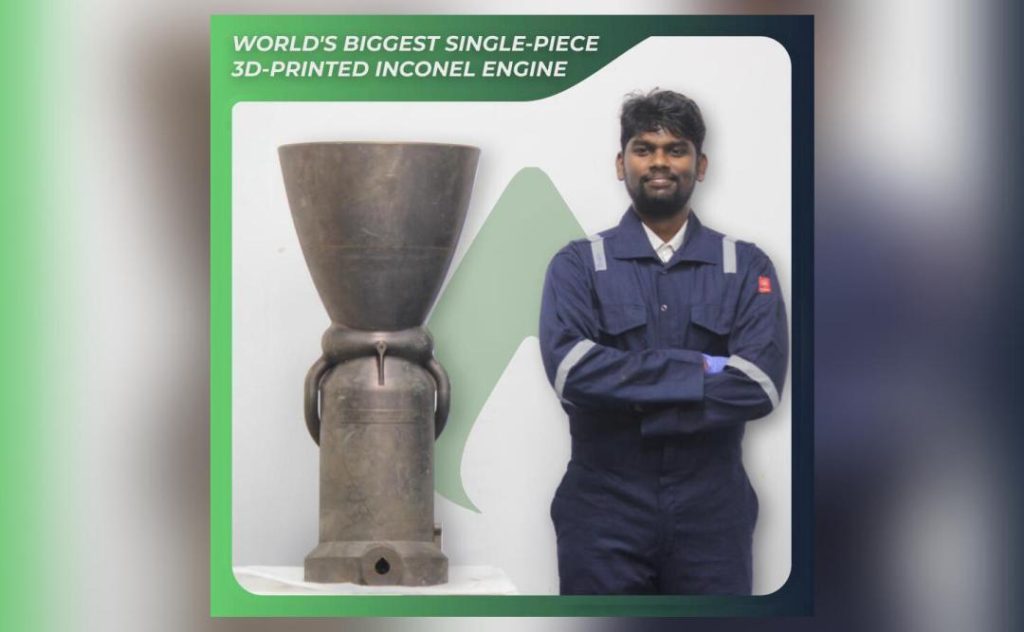
Indian Startup Builds World’s Biggest Single-Piece 3D-Printed Inconel Engine
The world of 3D printing has witnessed yet another groundbreaking innovation, this time courtesy of an Indian startup. AgniKul Cosmos, a pioneering company in the field of additive manufacturing, has successfully built the world’s largest single-piece 3D-printed inconel engine. This remarkable achievement not only showcases the company’s expertise in 3D printing but also marks a significant milestone in the development of additive manufacturing technology.
Inconel, a class of nickel-chromium superalloy, is renowned for its exceptional properties, including high-temperature resistance, corrosion resistance, and strength. The use of inconel in 3D printing enables the creation of complex geometries and structures that would be difficult or impossible to produce using traditional manufacturing methods.
AgniKul Cosmos’ latest achievement is a testament to the company’s dedication to pushing the boundaries of what is possible with 3D printing. The startup has received a US patent for its innovative design and manufacturing process, further solidifying its position as a leader in the industry.
“This breakthrough in additive manufacturing marks a major extension of our earlier accomplishment of making and flying the world’s first single-piece engine,” said a spokesperson for AgniKul Cosmos. “Our team has worked tirelessly to overcome the challenges associated with printing large, complex components, and we are thrilled to see our efforts pay off.”
The significance of AgniKul Cosmos’ achievement cannot be overstated. The development of a single-piece 3D-printed inconel engine represents a major shift in the way complex components are manufactured. Traditional manufacturing methods often require the assembly of multiple parts, which can lead to increased costs, reduced efficiency, and compromised performance. In contrast, 3D printing enables the creation of complex geometries and structures in a single, seamless process.
AgniKul Cosmos’ innovative design and manufacturing process have far-reaching implications for various industries, including aerospace, automotive, and energy. The ability to print large, complex components using inconel and other advanced materials has the potential to revolutionize the way products are designed, manufactured, and used.
In addition to its technical significance, AgniKul Cosmos’ achievement also highlights the growing importance of additive manufacturing in India. The country has been slowly but steadily building a reputation as a hub for innovation and entrepreneurship in the field of 3D printing.
AgniKul Cosmos’ success is a testament to the potential of Indian startups to drive innovation and disruption in various industries. The company’s focus on additive manufacturing and its commitment to pushing the boundaries of what is possible with 3D printing have earned it a reputation as a leader in the industry.
As the world continues to grapple with the challenges associated with climate change, sustainability, and resource conservation, AgniKul Cosmos’ achievement serves as a reminder of the importance of innovation and technological advancement. The company’s innovative design and manufacturing process have the potential to reduce waste, minimize environmental impact, and increase efficiency in various industries.
In conclusion, AgniKul Cosmos’ development of the world’s largest single-piece 3D-printed inconel engine is a groundbreaking achievement that marks a significant milestone in the development of additive manufacturing technology. The company’s innovative design and manufacturing process have far-reaching implications for various industries and highlight the growing importance of Indian startups in driving innovation and disruption.
Source: https://x.com/AgnikulCosmos/status/1953302371720950092






